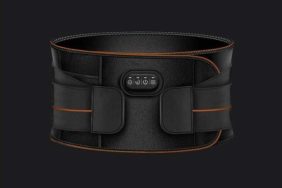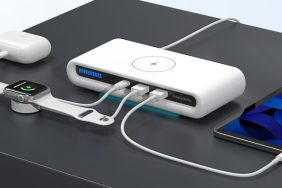When I got to interview Paul Walker for his latest movie, Hours, in mid-November, it was a happy time. I had spoken to him at SXSW before the film premiered, so this was my first chance to talk to him after seeing the film. We had a really great talk, with Walker really opening up to me but also just having a good time. With no entourage whatsoever, Walker drove himself to the Hours press junket. During our one-on-one interview, he kicked off his flip-flops and put his bare feet up on a coffee table while we spoke. It was magnificent. Now that Walker is tragically no longer with us, I treasure the brief time we spent together even more.
In Hours, he plays the father of a premature newborn abandoned in a hospital during Hurricane Katrina. Over the course of days, he has to keep his baby alive using only a hand cranked generator, which only leaves him a few minutes at a time to search the hospital for food, supplies and a way to call for help. Hours opens Friday in theaters and on VOD.
CraveOnline: Is Hours your Cast Away?
Paul Walker: I don’t know. I think Hours for me was, I’ve been really fortunate in the industry. It happened to me early on and I didn’t really want it. It just kind of fell in my lap. For once I feel like – I mean, it’s happened a couple times before – but really committing to something and then winning so to speak, on merit, on effort, just hard work, it feels good. I read it and I was really intimidated. I was like, “Well, it’s kind of sink or swim time, buddy. If you want to do this one, let’s really go and see what you can do.” The reaction and responses have been somewhat favorable for sure, but more than that it was really just an opportunity for me to test myself. To be able to sit back and go, “Hey, look. When you apply yourself, you can relax, when you have something you can really sink your teeth into.” So it’s cool.
I reference Cast Away because it’s basically you alone with that ventilator.
Oh, I thought you meant in terms of it’s Hanks’ best performance. It’s one of them for him.
And this may be yours, but did you think about how you’d command the screen by yourself?
Well, the volleyball was the scene-stealer in that. What was his name, Wilson? I mean, I can see that for sure.
Were you just working with a box, because there wouldn’t be a baby in there for most of the shots?
Yeah. It paralleled my life, man, so much of what was going on with that ventilator and what it represented to me really. The juggling just of life and trying to figure out who you are in it, what this represents and what that represents. Sometimes the blessing can be deemed as a curse. Sometimes the hurdles aren’t really hurdles at all. They’re welcome challenges, tests. Then you come out the end being on top.
The thing that was amazing is that I never realized it, just portraying a role, the body, the spirit doesn’t know any difference between what I’m practicing or pretending compared to reality. My victory, my journey in that, even though it was something that was induced, I was forcing myself into it. My spirit didn’t know that it wasn’t real. The thing that was amazing is at the end of the journey, because we shot it in sequence, at the end of it, that victory, achieving what Nolan achieved, that was my victory. It was pretty incredible. I learned a lot about myself on this one.
So what does the ventilator represent to you?
It gets real personal. It gets too personal but it was funny, I didn’t realize what was going on until about 2/3 into it. Then it hit me one night really hard. I was like, “Holy shit. This is what’s going on.” It just gave me a different perspective. I think it helped me realize a breakthrough that I don’t know that I would have realized otherwise.
So what we’re watching is even deeper than the intense narrative?
For sure, and I didn’t realize until I was well into it.
It’s a great “what if” to imagine what if someone were left in a hospital after Hurricane Katrina. Do we know of any patients this actually happened to, whether babies or adults?
I think it would probably be safe to assume some things happened. I would hope nothing as severe as this but it was just such chaos, I wouldn’t be the least bit surprised if people were found in the circumstance of being a hospital down there alone screaming for help, trying to figure out what the hell’s going on, forgotten about. I can almost guarantee that it happened.
How did you monitor the various states of exhaustion Nolan had to be in?
Monitoring was pretty easy just because we did shoot it, like I said, chronologically. We shot it in sequence. I was pretty fucking tired. Just living it every day, literally running up and down those damn stairs, running back and cranking on the damn thing, treading through at times damn near chest deep water, running around in soggy-ass pants and chafing between the legs and balls. My feet were just really soggy to the point where I started forming funky blisters. It almost looked like jungle rot between my toes by the end of production, but all that stuff played into it. I was able just to use it. I was really frustrated and really just miserable at times, physically exhausted, worn out.
At the end of the day though, it was amazing because looking back at what the day’s work entailed and coming out just going, “I told the truth the whole damn day.” If people like this, I remember telling my agent, “You know what? If I can maintain this, at the end of it if people don’t like my performance, people just don’t like me because that’s 100% me in every moment of it. I’m just telling the truth every day.” It’s pretty scary at the same time because people can critique you as an actor but there’s a lot of time, whether it’s Fast and the Furious, it’s hyper-real. There’s not much reality in it. It’s like my alter ego. My job is to show up and be cool all the time. There’s times where we do find heart in it but it always kills me when people go this or that, I get in Rotten Tomatoes or whatever.






